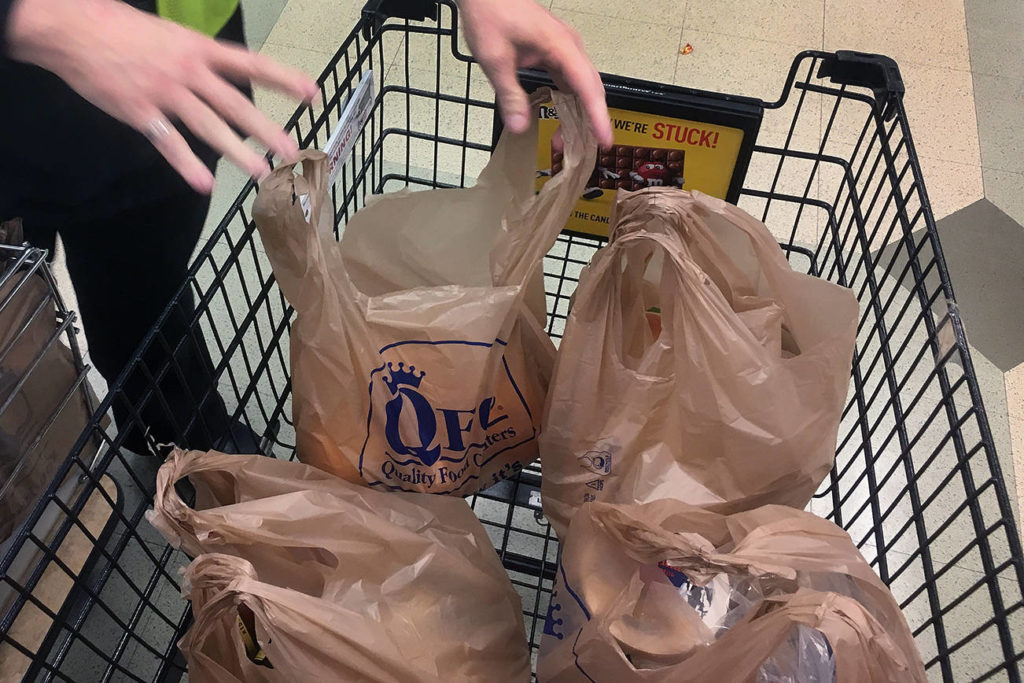Local retailers will continue to be able to distribute single-use plastic bags for one more year due to a vote by the Logan City Council to again postpone its much-delayed plastic bag ban.
LOGAN – The implementation of Logan City’s much-delayed ban on plastic bags has been postponed again, this time for a full year.
Members of the City Council voted unanimously Tuesday to amend the ordinance enacting a municipal code barring the distribution of single-use plastic grocery bags by making its effective date Jan. 1, 2022.
The culprit frustrating the wishes of local environmental advocates is, as usual, the coronavirus.
“When this ordinance was enacted (in December of 2019), we could not anticipate the COVID-19 outbreak,” explained Issa Hamud, the city’s environmental director. “When that happened, the ordinance was delayed or deferred simply because retail stores expressed the need to provide fresh, clean plastic bags rather than allowing customers to bring their own reusable cloth bags into the stores.”
The original implementation date for the local bag ban had been April 22, but that had already slipped to July 1 in early spring of 2020 to give members of the county’s Solid Waste Advisory Board (SWAB) more time to develop an associated countywide management plan for plastic wastes. In early summer, city council members voted to further delay the implementation until Jan. 1, 2021 due to the coronavirus.
“Here we are in December,” Hamud said, “and we’re still dealing with COVID-19 … so I’m suggesting that we push implementation (of this ordinance) back to 2022, by which time COVID-19 should no longer be a factor.”
After being assured that SWAB members also supported that suggestion, the council members voted to accept that delay.
The city bag ban was originally passed a year ago as a cooperative effort with Solid Waste Advisory Board. At that time, Logan joined Park City and Moab in pioneering efforts to reduce the pollution resulting from lightweight, single-use plastic bags.
That objective was to be accomplished through the simple expedient of making it illegal for any retailer to distribute disposable plastic bags to any customer. The county solid waste board planned to assist in the implementation of the ban with a public awareness program about the environmental impact of plastic wastes and by helping local retailers make the transition from plastic bags to reusable cloth satchels and bags made from recycled paper.
The original resolution passed by members of the city council specifically excluded many plastic bags from the ban that is slated to go into effect a year from now.
Those exemptions include bags provided by pharmacies; newspaper bags; laundry/dry cleaning bags; and, storage bags for food, garbage, pet waste or yard waste.
Also excluded from the ban are plastic bags used by consumers within retail stores to package bulk items such as produce, nuts, grains, candy or small hardware items; to wrap frozen food, meat or fish; and, to contain flowers and potted plants.
Despite the one-year implementation delay, the council members voiced continuing dedication to the ultimate goal of reducing the use of plastic bags in Cache County.
“Our intent was always to go along with a countywide management plan for plastic bags,” council chair Amy Anderson said. “I think as a community we need stick to that goal and I hope that other people also feel strongly about it.”
Council member Jeannie Simmonds agreed that even an extended delay in implementing the bag ban was preferable to cancelling it altogether.
“I believe that if we postpone implementation for a year,” she stressed, “we demonstrate a continuing commitment to work on this issue. That’s needed so that we can continue to move forward. Perhaps, by the time that we’re reconsidering this ordinance in a year, the (SWAB) management plan will be so efficient and effective that the ban will no longer be necessary.”
“We don’t want to make life difficult for businesses or citizens,” Hamud added after the council vote. “People are already dealing with difficult issues in terms of their health and workplaces and businesses. So we thought this delay is in the best interest of everyone involved.”

